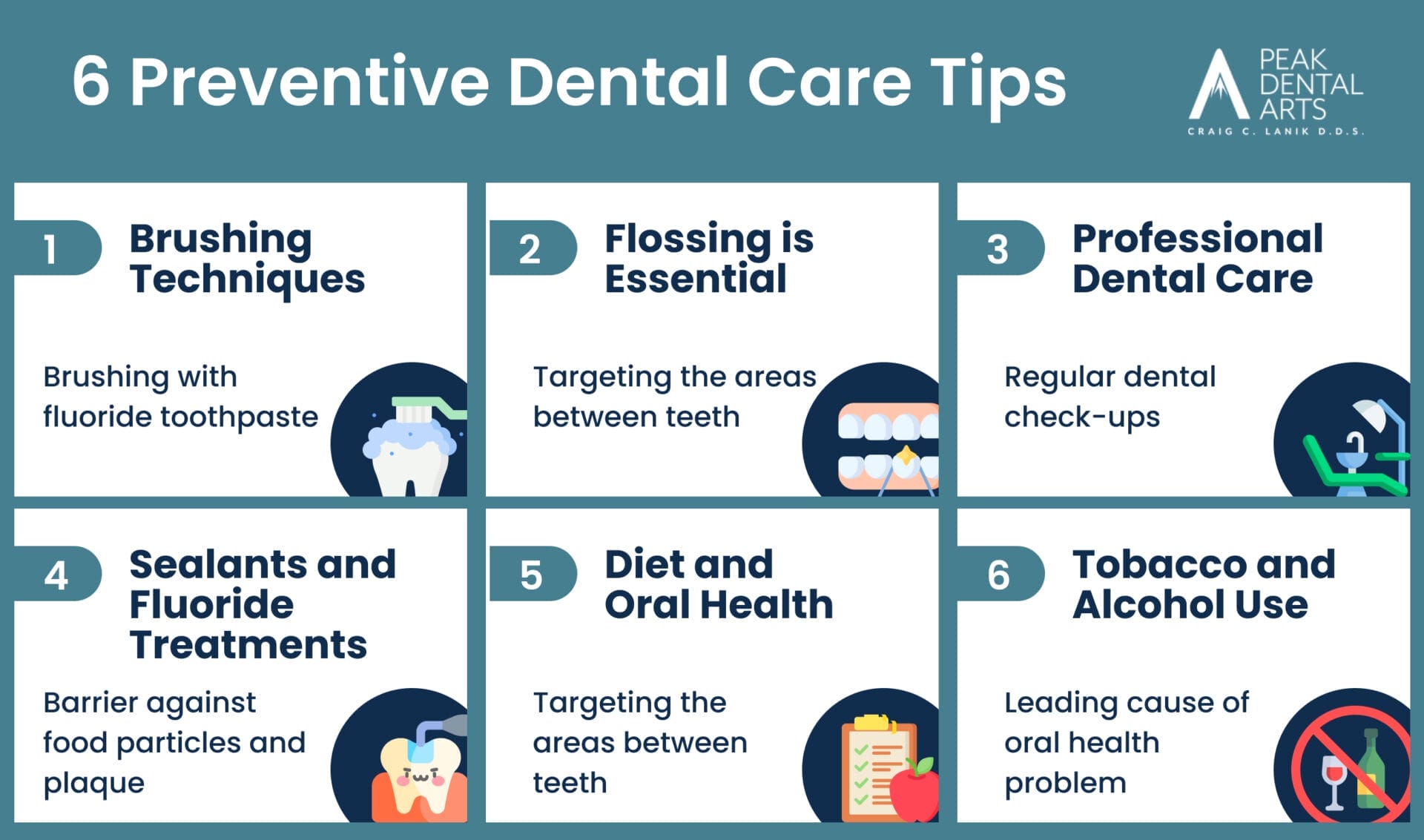Strong oral health practices are important ingredients for a winning smile and can significantly influence one’s lifespan and happiness.
Research shows that individuals who brush their teeth less than once daily face a 33% higher risk of gum disease. Further, maintaining 20 teeth or more at age 70 is linked to longevity, according to a 2015 study.
From regular check-ups to maintaining a balanced diet, each detailed strategy in this guide can pave the path to superior dental health and greater longevity and happiness.
What is Preventive Dental Care?
Preventive dental care encompasses a range of practices that address minor issues before they escalate into more serious problems that require complex treatments.
By minimizing the risk of developing tooth decay, gum disease, and other oral health issues, preventive dentistry leads to significant cost savings over time.
A study confirmed that routine preventive dental services were associated with significant average yearly cost savings. The same preventive measures reduced medical care expenses by 22%.

6 Preventive Dental Care Tips
Incorporating these preventive dental care tips into your daily and professional care routines can dramatically reduce the risk of dental diseases while keeping your smile bright, healthy, and strong for years.
1 – Brushing Techniques
Effective oral hygiene begins with the right brushing techniques, specifically with fluoride toothpaste. Fluoride, a critical agent in fighting tooth decay, strengthens tooth enamel and makes it more resistant to the acids produced by plaque bacteria and sugars.
For optimal results, brush for at least two minutes, covering all tooth surfaces with a soft-bristled brush. Don’t overlook the importance of cleaning your tongue to remove bacteria and give you a fresh breath.
2 – Flossing is Essential
Flossing complements brushing by targeting the areas between teeth that a toothbrush can’t reach. Using about 18 inches of floss allows you to gently clean the sides of each tooth with a careful up-and-down motion.
Alternatives like dental picks, pre-threaded flossers, interdental brushes, and water flossers offer practical solutions for those who struggle with traditional floss, especially for individuals with braces or dental restorations.
3 – Professional Dental Care
Regular dental check-ups are important for dental care — and they should be about every six months. These visits enable early detection of potential issues such as cavities and gum disease, facilitating less invasive and cost-effective treatments.
A professional cleaning, a staple of these check-ups, involves the removal of plaque and tartar buildup, particularly from areas difficult to reach through daily brushing and flossing. This process not only contributes to the prevention of gum disease but also provides an opportunity for your dentist to conduct a thorough examination and, if necessary, perform X-rays to assess your oral health comprehensively.
4 – Sealants and Fluoride Treatments
Dental sealants and fluoride treatments are two powerful tools in the preventive care arsenal.
Sealants are thin, protective coatings applied to the chewing surfaces of the back teeth (molars), effectively creating a barrier against food particles and plaque. Dental sealants for children are particularly beneficial, as kids and teenagers are most prone to cavities in these areas. Adults can also benefit from dental sealants.
Fluoride treatments involve the application of fluoride directly to the teeth in higher concentrations than what is found in toothpaste or water supplies. These treatments strengthen the enamel, making it more resistant to decay.
5 – Diet and Oral Health
Sugary and acidic foods should be consumed cautiously, as they can lead to cavities and wear down tooth enamel.
A balanced diet of fruits, vegetables, lean proteins, and whole grains supports dental health. Dairy products like cheese and yogurt are particularly beneficial as they help neutralize mouth acids. Drinking plenty of water throughout the day, especially after meals, helps cleanse the mouth of food particles and bacteria, further protecting against decay.
6 – Tobacco and Alcohol Use
The use of tobacco products, including cigarettes, cigars, and chewing tobacco, has a profound impact on oral health.
Tobacco use is a leading cause of gum disease, as it affects the attachment of bone and soft tissue to your teeth. It increases the risk of oral cancer and can lead to complications in healing after dental procedures. Smokers are also more likely to experience tooth discoloration and bad breath.
Excessive alcohol consumption can contribute to oral health problems. Alcohol’s dehydrating effect on the body can lead to dry mouth, which decreases saliva flow and allows harmful bacteria to thrive, increasing the risk of tooth decay and gum disease. Additionally, alcohol abuse is another risk factor for oral cancer.

Special Considerations for Different Ages
By recognizing the specific dental care needs at different stages of life, you can take proactive steps to make sure you and your loved ones of all ages maintain good oral health.
Preventive Dental Care for Children
Pediatric dental care should begin when a child’s first tooth appears or by their first birthday. These initial visits set the stage for a lifetime of good oral health habits and help to acclimate children to the dental office environment, reducing anxiety about future visits.
Preventive measures for children include applying fluoride varnish to strengthen developing teeth and using dental sealants to protect the grooves of the back teeth, where most cavities in children are found.
Teaching children the importance of brushing twice a day with fluoride toothpaste and flossing daily is also essential. Additionally, discussions about the impact of diet on dental health can encourage healthier eating habits.
Oral Care for Older Adults
For adults, regular dental check-ups monitor for signs of oral cancer and manage chronic conditions that affect oral health, such as diabetes. Dentists can recommend specialized oral hygiene tools or techniques to accommodate physical limitations and provide treatments for dry mouth.
Embrace Preventive Dental Care for Lifelong Oral Health Today
From the foundational habits instilled in childhood to the specialized care required in older adulthood, each stage of life benefits significantly from a proactive approach to dental wellness.
Schedule that dental appointment you’ve been postponing, refine your daily oral hygiene routine, and consider how your lifestyle choices affect your oral health.

